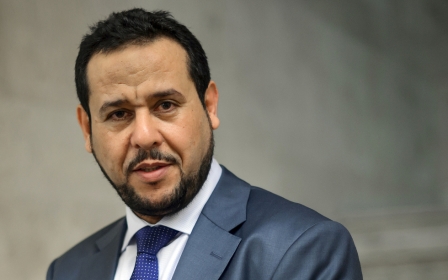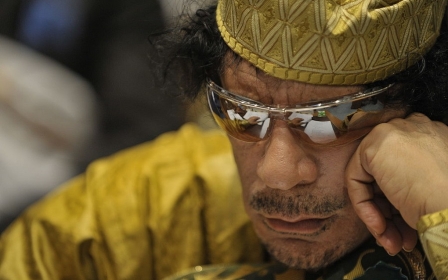UK government to announce settlement in Belhaj rendition case

A dramatic settlement in the legal case of prominent Libyan dissident Abdel Hakim Belhaj is expected to be announced on Thursday, ending a seven-year dispute that has seriously damaged the reputation of Britain’s foreign intelligence agency, MI6, and raised questions about the integrity of British officials.
Britain’s attorney general, Jeremy Wright, the government's top lawyer, is due to make a statement to the House of Commons, watched by Belhaj’s wife, Fatima Boudchar and her teenage son Abderrahim.
Belhaj, a military commander in Libya, will make a statement in Istanbul soon afterwards.
Belhaj and his wife were seized in Bangkok in 2004 in a joint MI6–CIA operation that led to their secret rendition to Tripoli where they were tortured by Muammar Gaddafi’s security forces.
A fellow member of the Libyan Islamic Fighting Group (LIFG), Sami Al-Saadi, was also rendered to the Libyan capital in a joint MI6-CIA operation. Saadi was also tortured, later accepting compensation of £2.2 million ($3m) from the British government.
Belhaj has always insisted he would settle for just £1. But he has also demanded an apology from the British government, an admission that its intelligence agencies connived in his capture and wrongdoing.
In an interview with Middle East Eye last year, Belhaj said: "If the British government or those involved admit to what has happened and apologise I am happy to end it like that."
Belhaj and Saadi were released from jail in Tripoli in 2010 under a reconciliation deal arranged by Gaddafi’s son Saif al-Islam.
British officials, including Jack Straw, at the time the foreign secretary who was responsible for MI6, repeatedly denied that they had anything to do with the rendering of terror suspects, a practice more widely undertaken by the CIA.
However, the truth was revealed, with extraordinary irony, in 2011 when NATO aircraft destroyed the offices of Gaddafi’s intelligence chief, Moussa Koussa.
'The least we could do'
Among the documents found by journalists in Tripoli was a letter to Koussa, dated 18 March 2004, from Mark Allen, MI6’s counter terrorism chief. Allen congratulated Moussa on Belhaj’s “safe arrival” in Tripoli, adding that British involvement in the operation was "the least we could do for you and for Libya to demonstrate the remarkable relationship we have built over the years".
The rebuilding of relations between the British government and Gaddafi's Libya in the early 2000s, as the US and the UK sought new allies in their fight against al-Qaeda, came after decades of enmity.
Gaddafi armed the Irish Republican Army (IRA), which carried out bomb attacks in the UK between the 1970s and the 1990s and waged an armed campaign against British soldiers in Northern Ireland, and Libya was responsible for the bombing of a Pan Am airliner over Lockerbie, Scotland, in which 270 people died.
The UK allowed the US to conduct air strikes against Libya from bases in the UK in 1986, while MI6 is alleged to have been involved in a plot to assassinate Gaddafi in 1996.
But Gaddafi became a close friend of then-prime minister Tony Blair’s Labour government, promising to give up developing chemical and nuclear weapons in 2003, with British oil companies also picking up lucrative oil contracts in Libya.
Gaddafi became an enemy once more after after threatening to massacre Libyans opposed to him during the 2011 “Arab Spring” uprising which, backed by NATO air strikes, led to his downfall and death.
Strongly backed by ministers, MI6 and British government law officers went to extraordinary lengths to stop Belhaj’s case from being heard in the courts.
After a four-year police investigation, Britain’s Crown Prosecution Service announced that neither Straw nor Allen would face charges because of insufficient evidence although Allen had “sought political authority for some of his actions albeit not within a formal written process nor in detail...”
In a carefully-worded statement the CPS added: “There is sufficient evidence to support the contention that the suspect had been in communication with individuals from the foreign countries responsible for the detention and transfer of the Belhaj and al-Saadi families; disclosed aspects of what was occurring to others within this country; and sought political authority for some of his actions albeit not within a formal written process nor in detail which covered all his communications and conduct."
However, the CPS went on: "Officials from the UK did not physically detain, transfer or ill-treat the alleged victims directly, nor did the suspect have any connection to the initial physical detention of either man or their families."
An indication that the police believed they had sufficient evidence for a criminal prosecution in what they called Operation Lydd is clear from a little-noticed answer to a question put to London Mayor Sadiq Khan in October 2016.
“The Metropolitan Police submitted a comprehensive file of evidence (in excess of 28,000 pages) to the Crown Prosecution Service seeking to demonstrate that the conduct of a British official amounted to Misconduct in Public Office”, Khan said.
So desperate was the British government to prevent further details of Belhaj’s rendition from being disclosed that they said that British courts could not hear the case because it involved agents of foreign powers, a reference to the CIA's role in the operation.
'No recollection'
But Britain’s Supreme Court rejected the claim given what they called the seriousness of the allegations. Then the British government said any hearings must be heard in secret. It also said that the government’s lawyers should not have to disclose why they decided not to prosecute.
In the latest court hearing, Britain’s most senior judges rejected this argument.
After the Allen letter came to light, Blair said he had “no recollection at all” of the Libyan rendition. Jack Straw told MPs in 2005 – a year after the Libyan abductions – that “there is simply no truth in the claims that the United Kingdom has been involved in rendition full stop.”
After the Allen letter emerged, Straw said: “No foreign secretary can know all the details of what its intelligence agencies are doing at any one time.”
British government officials have insisted that the operation was in response to “ministerially authorised government policy”. Richard Dearlove, head of MI6 at the time, has said: “It was a political decision, having very significantly disarmed Libya, for the government to cooperate with Libya on Islamist terrorism.”
How much the British government will admit in this saga will be known on Thursday.
Stay informed with MEE's newsletters
Sign up to get the latest alerts, insights and analysis, starting with Turkey Unpacked
Middle East Eye delivers independent and unrivalled coverage and analysis of the Middle East, North Africa and beyond. To learn more about republishing this content and the associated fees, please fill out this form. More about MEE can be found here.




